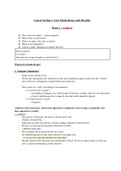Summary
Extensive Perspectives on Law Summary from 2021 (weeks 1-12)
- Course
- Institution
This document covers all topics which are discussed throughout the course from weeks 1-12. It contains all relevant and mandatory readings + class notes from the course 2021. Those may be helpful for conducting the essays. The document contains the following topics: Week 1 - Antigone Week 2 ...
[Show more]



